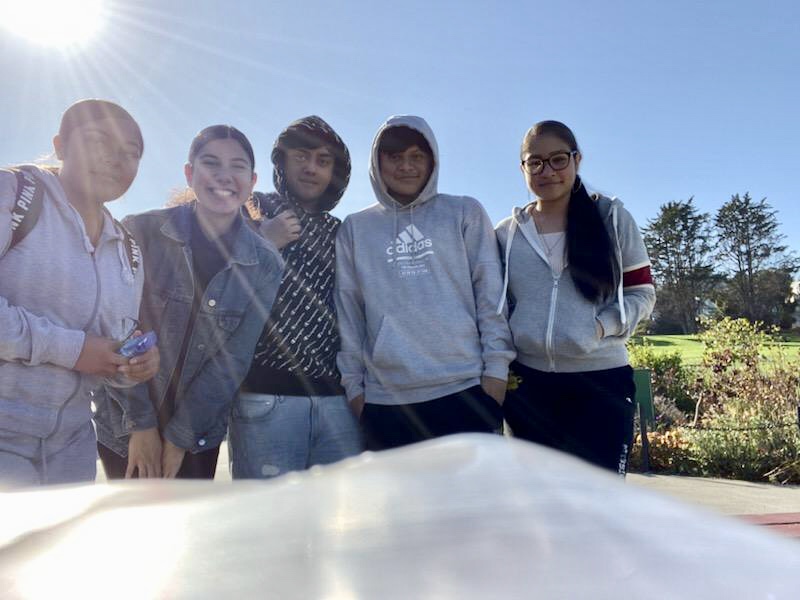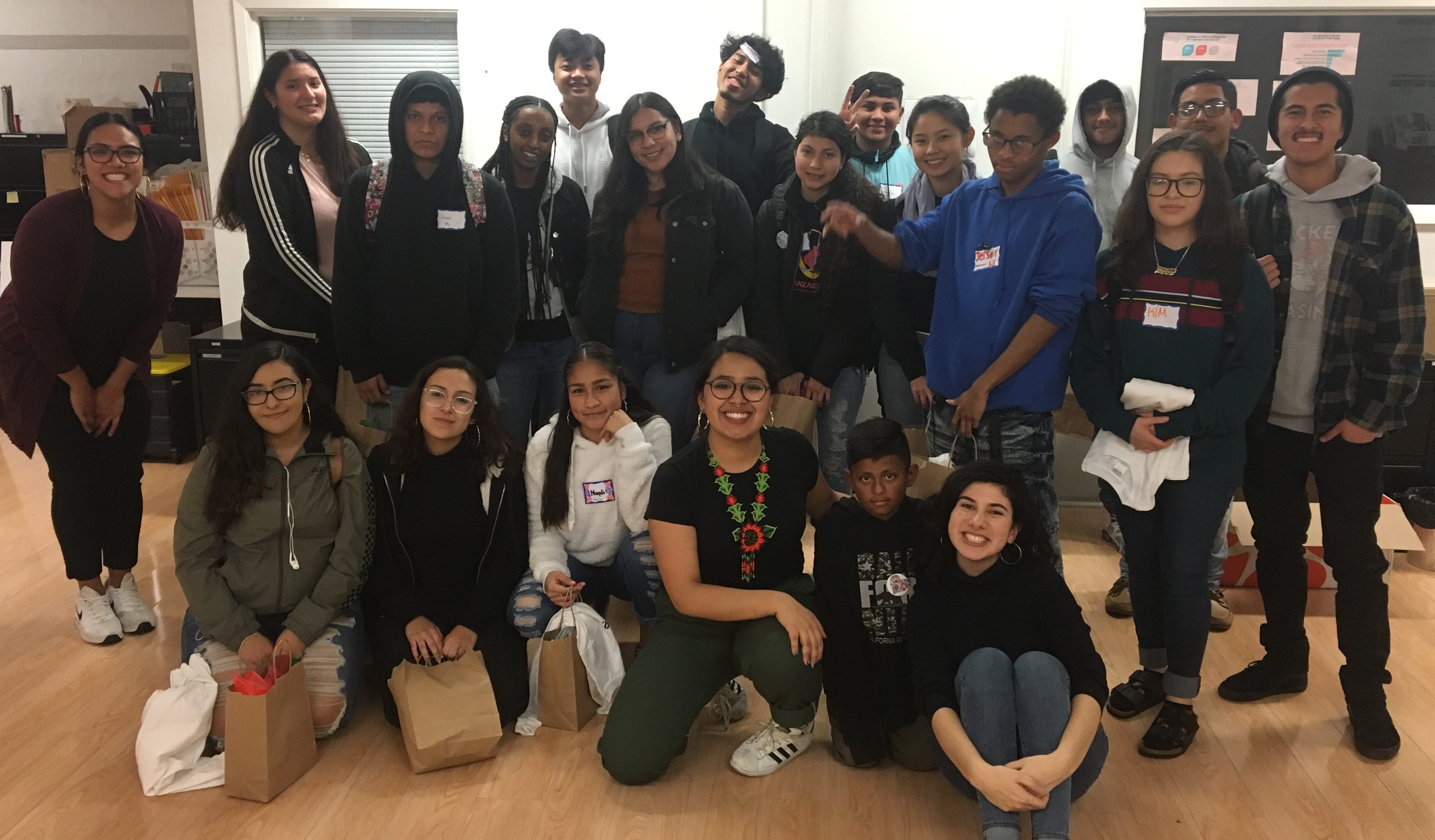Everyone in youth development knows that the first year is the hardest. Youth programming is complex, with many moving parts and partners to deal with. And, despite all the training and prep, standing in front of a room full of youth for the first time can be quite intimidating.
But we do it – we survive and thrive, and come out on the other side with raw and brilliant insights on what it means to work with youth. Following is the first in our series From the Frontlines of Youth Development.

Healing the wounds of our community comes with healing our own. As a proud first generation college student, I came back to do community work as a full-time youth program facilitator at yli. It was challenging. Even though I attended trainings, workshops, and shadowed my peers, none of that prepared me to facilitate a program on my own. I really had to be thrown in, fail, and then learn from it all. The entire year, my imposter syndrome was high – and a huge learning lesson.
Facilitating in a high school brought all the flashbacks. I saw the power dynamics when I walked through the hallways – people not wanting to go to class, roaming around, or teachers kicking students out and having difficult conversations with them about their disruptive behavior that may be tied to deeply rooted trauma. These were all reminders of what I saw at my own high school – Mount Eden in Hayward.
When I first started facilitating, I felt really impatient. Since I had not been in a high school setting in a long time, I had forgotten what it looked and felt like. I had also forgotten how shy young people can be, and how much time it takes for them to open up. I was really focused on recruiting and getting to the work of the program. I felt pressured to get to know everyone on a deep level right away. But I had to take a step back and remind myself that building relationships takes time! Not everyone was ready to share those parts of themselves yet. Many of them came into my workshops expecting to be oppressed because that’s what they’ve been experiencing all day from our school systems.
During these moments, I reflected back on who I was in high school and I had to remember that these youth are just starting to have conversations about racism and politics.
For many, this was the first time they had a place to share and acknowledge the hurt that they felt around the Trump administration and our political climate. For others, it was also the first time building a relationship with an adult ally who cared! I had to re-center myself in their experiences, understand who they are, and what their next steps look like after high school.
Working with youth is spiritual and sacred work, and building relationships with them takes time. As a first year PC, I really learned how to engage with young people, adapt to energy, and not give up on getting to know them. I walked into our first workshop wanting to build relationships quickly but it took patience, not taking things personally, and going the extra step, always. It took me texting them, “Good luck on your exam,” following up with them after exams or their sport games, and getting lunch with them individually. Those extra steps showed them that I cared!
Young folks may not have people to check on them – everyone’s always so busy – and they are not used to someone asking them how they are doing. I was also a product of a youth development program in high school, and my mentor Moneek was able to show that to me. She always wanted to know how I was doing or grab lunch with me. She would make time to come visit me on campus. I was always surprised, and this is how I promised to show up for young people!
There were times throughout the program when young people would stop showing up. At one point, I had an honest conversation with them where they could give me feedback on ways to improve. I really listened and incorporated their opinions as well as topics and activities they were interested in, and they really appreciated that. They told me that few people actually listen to them or take into consideration what they want to do. I thought that was really powerful – it was a growth moment for me – and it made me wrap up fall feeling really proud of the relationships I had fostered with them.

It also took a bit of vulnerability and opening up on my end to create a bond. I noticed I struggled with sharing my opinions as a facilitator. I didn’t want to influence them to feel or think a certain way, so I’d come in with topics and encourage them to have critical dialogues. I wanted them to form their own opinions, to center their voices, without feeling pressured to follow someone else’s. I know that my own analysis has taken time to develop.
As a youth, I saw the dropout rates in my hometown of Hayward, but it was not until college that I connected these experiences with larger systems of power.
I wanted to make space and give my youth time to become politicized in their own way, so I was careful about creating a space in which the youth could engage. Essentially, it also led to me not sharing much about myself. But they wanted to know about me – my opinions on Trump, immigration, gentrification, and even about my own experiences. In these moments, I would shift it back to them. I’d say, “Well, what do you think? How does this impact you?” I’d try to get them to think more critically about how an issue involves and impacts their identities.
I’m still finding the balance and trying to understand my own model of sharing opinions. One thing I always continue to center is my own truth and authenticity. A few of my youth had very different opinions about gentrification, for example. One believed it was actually benefiting the city and so I had to be careful – but not afraid – to challenge young folks in their thought process. When we started talking about alcohol, the youth asked me about my own experiences and I had to be honest with them. I feel that a big part of being an adult ally and a youth organizer is being real about your own experiences and not sugar-coating the realities. This also increased their trust in me.
Lastly, I had to learn that young people will sometimes give you a hard time for no reason, mainly because they are so used to being in a school with teachers who are not as supportive or who don’t see their fullest potential. I wish I had known that dealing with personalities was going to take time, empathy, and radical compassion. Their behavior was a reflection of how they were feeling, whether that was in school or home life. When I finally got to know my youth and see those relationships blooming, it was really beautiful to witness. It showed up in small moments like young people asking about me when I got sick, texting me: “How are you?” or saying that they missed the program. Some youth would pretend like they were too cool for my program, but they came up to me after it ended and admitted that they really liked the program!
This year, I’m looking forward to knowing my program, coming in with knowledge and letting go of the fear.
I’ve already seen one full year through, and so I have a much better understanding on how to navigate situations. My approach is different. I’m adding more humor, creativity, and popular culture! Young people are so on trends and memes. I feel the energy is more intentional on having fun, creating lightheartedness, and building community. I’m focused on building a safe space and really creating that ability for young people to feel collective liberation.
